The 55th Session of the Human Rights Council
26th February – 5th April 2024
Agenda Item 3: Interactive Dialogue with the Special Rapporteur on minority issues
21st March 2024
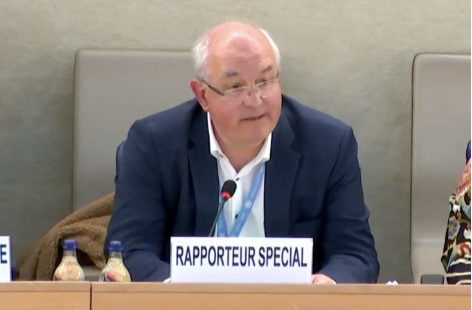
Executive Summary
The United Nations Human Rights Council (UNHRC) convened an Interactive Dialogue with Professor Nicolas Levrat, the Special Rapporteur on Minority Issues, focusing on protecting and promoting minority rights globally. Established in 2005, the Special Rapporteur's mandate involves monitoring, reporting, and making recommendations on minority rights issues worldwide. Professor Levrat's report highlighted the significance of minority rights in strengthening the Universal Declaration of Human Rights (UDHR) and outlined strategies to address challenges faced by minority communities. The report emphasised the complementary nature of minority rights to universal human rights, advocating for their recognition and protection. The report also underscored the vital role of minorities in fostering societal diversity and cohesion. Key priorities included integrating minority issues into UN activities, enhancing the annual Forum on Minority Issues, and establishing regional minority forums.
During the Interactive Dialogue, representatives from various countries and civil society organisations expressed support for the Rapporteur's initiatives while raising concerns about the rise of majoritarianism and discrimination against minority groups. Professor Levrat affirmed his commitment to a tailored, bottom-up approach, emphasising the importance of addressing minority rights within the socio-economic context of each country and adopting an intersectional approach.
The Geneva International Centre for Justice (GICJ) echoes the support for the Rapporteur's efforts and urges all stakeholders to prioritise protecting and promoting minority rights as a fundamental aspect of human rights and social justice.
Background
Among the UNHRC’s mandates, the position of Special Rapporteur on Minority Issues in 2005 addressed concerns related to the rights of persons belonging to national or ethnic, religious, and linguistic minorities. The mandate of the Special Rapporteur encompassed monitoring, reporting, and making recommendations on issues pertaining to minority rights globally. Since its inception, the role has been instrumental in highlighting the challenges faced by minority groups, advocating for their protection and promotion, and fostering dialogue among states and relevant stakeholders.
Over the years, the Special Rapporteur has produced numerous reports addressing various minority rights issues, including discrimination, access to justice, political participation, cultural preservation, and socio-economic disparities. These reports have served as crucial tools for raising awareness, generating debate, and influencing policy decisions at national and international levels. Critical international instruments, such as the Declaration on the Rights of Persons Belonging to National or Ethnic, Religious, and Linguistic Minorities and the International Covenant on Civil and Political Rights, guide the Special Rapporteurs' work. The previous Special Rapporteur, Fernand de Varennes, was active in various events and engagements related to minority issues throughout 2023. These activities included participating in conferences, engagements with government entities, and collaborations with UN entities and civil society organisations.
Despite significant progress in the recognition and protection of minority rights, challenges persist, including ongoing discrimination, marginalisation, and violence targeting minority communities. Moreover, the evolving global landscape, marked by increasing diversity, migration, and globalisation, underscores the continued relevance and importance of addressing minority rights issues in contemporary society.
Report of the Special Rapporteur
In this context, the report A/HRC/55/51 from the Special Rapporteur on Minority Issues, Nicolas Levrat, outlines the current state of minority rights and proposes strategies for promoting diversity to strengthen the universal dimension of human rights. The Special Rapporteur articulates three main issues: the contribution of specific treatment of minority groups to the Universal Character of Human Rights, the interaction between minority rights and individual human rights, and the role of minority identities in national identity. The report emphasised the importance of recognising and accommodating differences in implementing human rights to ensure equal enjoyment of rights by persons belonging to minority groups. To achieve this, the report stressed that the rights associated with minority groups are complementary to the universal human rights enjoyed by all individuals, as outlined in international declarations and covenants. These additional rights enhance the protection and recognition of minority identities within societies.
Moreover, the report highlighted the fundamental right of individuals to freely choose whether to identify with a minority group or integrate into the majority, emphasising the importance of respecting individuals’ self-identification. Additionally, it underscores the invaluable contributions of minorities to society as a whole, advocating for preserving and promoting minority identities as vital components of societal diversity and cohesion. The Special Rapporteur outlined specific priorities for the mandate, including the protection and promotion of minority rights, integration of minority issues in UN activities, and establishment of a special fund for minorities. Furthermore, the report outlines thematic reports planned by the Special Rapporteur, covering topics such as minority issues, identity, representation of minorities, and their inclusion in the post-2030 agenda.
The report ended with conclusions and recommendations from the Special Rapporteur that underscored several vital points. Firstly, it emphasised the intricate nature of minority issues, advocating for tailored, nuanced approaches that acknowledge the specific needs of minority groups within each state. This approach, the report argued, aligns with the UN's stance on minority rights and contributes to the Universal Declaration of Human Rights. Secondly, there was a call to address the perspectives of majoritarian populations on minority issues, which are often overlooked but crucial for effective implementation. Thirdly, there was a proposal to extend the duration of the annual Forum on Minority Issues to allow for more comprehensive discussions and the development of regular regional minority forums to ensure representation from all regions.
Additionally, States were urged to integrate minority issues into the Sustainable Development Goals and the post-2030 agenda, focusing on leaving no one behind. Collaboration and cooperation among relevant human rights mechanisms are encouraged to enhance minority rights realisation, alongside strengthening links between the mandate and minority-focused networks within the OHCHR. Lastly, the report suggested establishing a global academic network on minority issues through specialised workshops.
Overall, the report emphasises the imperative need to safeguard minority rights, foster diversity, and ensure the meaningful participation of minorities in decision-making processes at both national and international levels. Its recommendations aimed to promote better understanding, representation, and integration of minority issues across various levels of governance and society.
Interactive Dialogue

Professor Nicolas Levrat, Special Rapporteur on Minority Issues, opened the session by quoting the Secretary General’s 2022 statement, “We are not dealing with gaps; we are dealing with outright inaction and negligence in the protection of minority rights.” He thus endeavoured to continue the work of the previous mandate holders. Drawing on his experience as a university professor working on individual rights, State sovereignty, and principles of international law, he aimed to dedicate his time, energy, and intellect to giving a voice to the issues of minority communities globally. Levrat further noted that constructive cooperation with internal and external stakeholders and his employment of a bottom-up approach would be central to his work.
He prioritised collecting data on minority groups’ concerns globally through collaboration with advocacy groups and academic partners. Levrat further noted that country visits may be an effective way to proceed with this task and hoped to enjoy the cooperation of the HRC’s Permanent Representatives. In addition, Levrat stated that he would not be commenting on the previous Special Rapporteur’s, Fernand de Varennes, country visits to Paraguay (A/HRC/55/51/Add.1) and Tajikistan (A/HRC/55/51/Add.2), as he did not personally conduct them. There were no glaring red flags to discuss.
Recalling the Secretary General’s statement, he noted that his second priority is to integrate minority rights issues into UN activities better. To do so, he aimed to map existing minority issues within the multilateral system, including various UN agencies and specialised organisations, and include minority issues in the UN’s post-2030 agenda. Therefore, he wanted to ensure that it was understood that the protection and promotion of minorities, as per Article 1 of the 1992 Declaration, was not just for the benefit of minority groups but for society as a whole by developing a rich national identity.
For this reason, not only will the relationship between minorities and the State be a priority for his mandate, but also the relationship between the full enjoyment of individual rights and the specific rights of minority groups. For example, working to promote minority groups' expression of their unique identities should not be at the expense of their ability to exercise their universal individual rights.
Thus, within his mandate, he has been tasked to lead the annual Forum on Minority Issues, an essential platform for minority groups to voice their concerns. Levrat said he would dedicate time to improving the Forum’s format, duration, and funding to provide more time for valuable discussion. In addition, he stated he continues to be committed to creating Regional Minority Forums to increase accessibility for minority groups who otherwise can not participate in the Forum in Geneva. Finally, drawing on his academic background, he wanted to create a network of academic projects focusing on local minority issues centred on experiences, methods, and best practices. He noted that he has already received positive responses from academics worldwide.
Countries Concerned
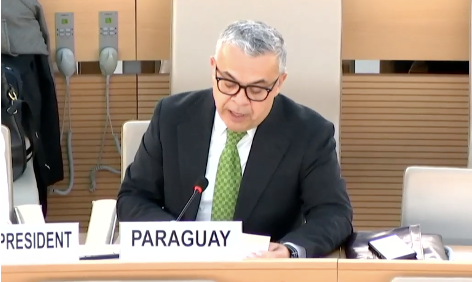
The Representative of Paraguay began by welcoming the previous Special Rapporteur for his visit to the country and reiterated Paraguay’s open invitation to the Human Rights Council since 2003. He has noted the central role of these visits and reports in shaping Parguay’s national policies and how this, in conjunction with the country’s motivation to improve its systems, has led to successful reform. He affirmed that Paraguay had taken seriously both the recommendations and concerns expressed by the Special Rapporteur in his report and published a detailed response. In particular, he was pleased to see the Special Rapporteur praised Paraguay’s efforts despite its historical economic and social challenges. To build on this, the Representative stated that Paraguay will continue to improve its legal and social infrastructure to address persistable issues.
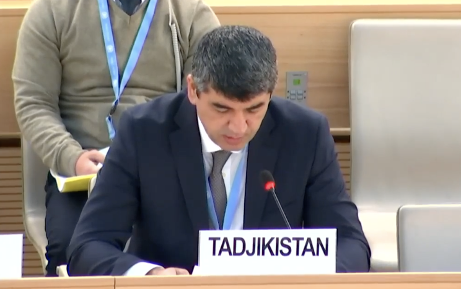
The Representative of Tajikistan opened by emphasising the country’s readiness to continue cooperation with the Special Rapporteur on minority issues. He stated that, following the Special Rapporteur’s report, Tajikistan has incorporated the recommendations into the National Strategy for Human Rights Protection Up to 2038 and Action Plan for 2023-2025. He then continued to cite Article 17 of the Tajikistan Constitution as proof that all people are equally protected in the country and continued to argue that the various ethnic minorities in the country are content with the government’s “ethnic policies”. However, he provided little evidence of such. The Representative continued justifying Tajikistan’s internal policies of harmony and friendship, from the choice of language and religion to equality of opportunity, similarly for the rest of his speech. He then concluded his speech by pushing back against the Special Rapporteur’s claim, stating that the people of the GBAO region are not a national minority and that that is an “undisputed fact”.
Interested Delegations
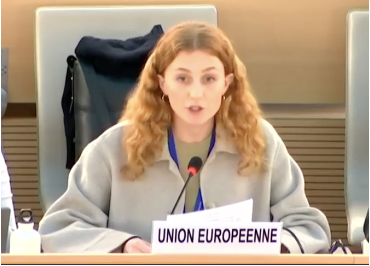
The Delegate of the European Union called upon all States to work proactively to protect the rights of minority groups and reiterated the EU’s commitment to this issue. Recalling the EU’s Human Rights Guidelines on Minority Conditions, the Delegate condemned all acts of violence against minority groups. She urged States to listen to young human rights activists who work to amplify the intersecting harms faced by minority groups and to include them in UN and policy discussions. She then asked the Special Rapporteur to elaborate on his aim to work on “bottom-up approaches” in his mandate.
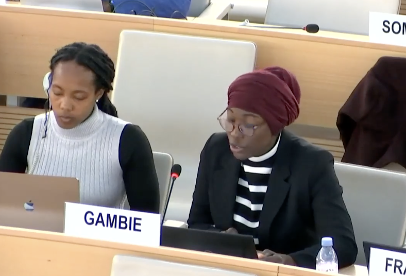
The Representative of Gambia, on behalf of the African Group, commended the Special Rapporteur on his ability to illustrate the complexities of protecting minority rights and agreed with his view that there is a strong link between minority rights and the fight against discrimination. She was proud to share that the African Group has made the protection of minority rights a priority in national law. However, she also expressed the Group’s concern about misconstruing the definition of minority rights away from its original Article 27 definition, which ignores the sensitivity and complexity of the issue.
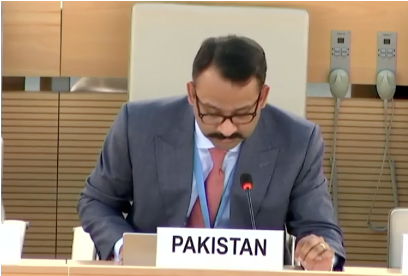
The Representative of Pakistan affirmed the country’s firm commitment to minority rights, citing Pakstain’s recent legislation, which paved the way for an independent statutory commission for minorities. Furthermore, he expressed concern for how minority communities have been experiencing increased violence and are consistently being scapegoated for “narrow political gains”. The Representative spoke about an unnamed country in South Asia, which he sees as weaponising majoritarianism to cause communal hatred and violence, and how this is a growing trend globally.
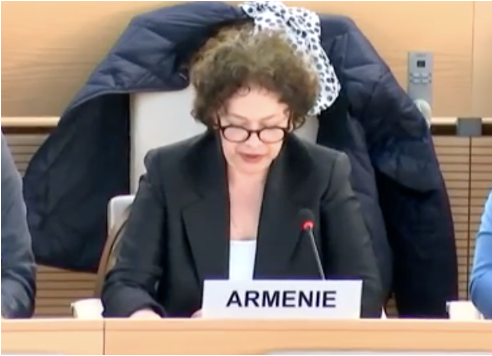
The Representative of Armenia thanked the OHCHR for its report and its reference to the ethnic cleansing of Nagorno-Karabakh and the extra-judicial executions taking place. The Representative echoed the report and urged Azerbaijan to guarantee the rights of ethnic Armenians in the Nagorno-Karabakh region. She reminded the Council that the human rights violations committed by Azerbaijan have been under the attention of this mandate since there has been a recorded pattern of violations, including the destruction of Armenian cultural heritage. She concluded by citing the Freedom House’s report that political rights in Azerbaijan have dropped below Afghanistan and that, for this reason, Azerbaijan was excluded from the parliamentary assembly of the Council of Europe, reaffirming that ethnic Armenians are under serious threat in Azerbaijan.
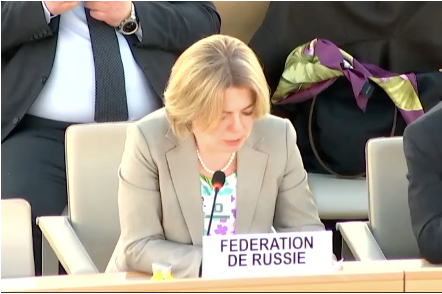
The Representative of Russia began by expressing concerns about how the previous Special Rapporteur addressed specific themes in his report. She urged the current Rapporteur to consider the discrimination of Russian speakers in Ukraine, as has been previously flagged by the UN Human Rights Monitoring Mission to Ukraine and the Committee on Elimination of Racial Discrimination. She further expressed concerns about the gaps in minority rights protection in “so-called countries with developed democracies” and urged the Rapporteur to address the existing deficiencies in national legislation.
Civil Society Organisations expressed deep concern for the rise of majoritarianism worldwide, which threatens the meaningful inclusion and participation of minority groups. They affirmed the Rapporteur’s bottom-up approach, stating that the protection of minority groups must be supported by a deep understanding of their local contexts. Many organisations urged the Rapporteur to adopt an intersectional approach in his work and address the harm suffered by many minority rights activists worldwide.
Concluding Remarks
Professor Levrat addressed specific vital issues highlighted by various Representatives. He addressed his goals with this “bottom-up approach,” which rejects the idea of a one-size-fits-all solution and instead works to tailor recommendations to the socio-economic realities of each country. In addition, he affirmed the critical role the Regional Forums and academic networks will play in providing innovative and cooperative solutions to the issue. He also commended the Sikh Human Rights Group’s idea for pursuing a Declaration for Diversity. Finally, he agreed that an intersectional approach is essential in his mandate, especially when addressing the discrimination experienced by minority women. He ended by cementing his availability to assist and support permanent representatives.
Position of the Geneva International Centre for Justice
Geneva International Centre for Justice (GICJ) strongly supports the efforts outlined by Special Rapporteur Professor Levrat to address the critical challenges facing minority communities globally. GICJ acknowledges the complex nature of minority rights issues and supports initiatives such as extending the Forum on Minority Issues and establishing regional minority forums. Moreover, GICJ underscores the importance of tailored approaches to address the unique needs of minority groups in each state. GICJ shares the concerns other civil society organisations raised regarding the rise of majoritarianism and the need for an intersectional approach. Therefore, we call on all states and relevant stakeholders to prioritise protecting and promoting minority rights as a fundamental aspect of human rights and social justice.







